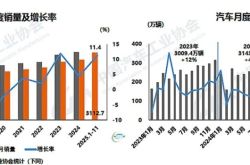The pain of high-paying AI jobs, best understood by 11.86 million fresh graduates
![]() 10/30 2024
10/30 2024
![]() 552
552
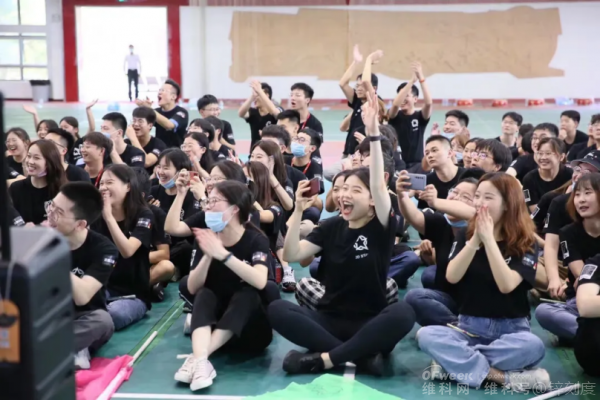
It's easy to open an AI major, but it's not easy to cultivate talents
Written by / Chen Dengxin
Edited by / Li Ji
Typeset by / Annalee
The 2024 autumn recruitment season is nearing its end.
In recent years, the number of college graduates has been increasing year by year, and it is expected that the number of fresh graduates in 2025 will reach a record high of 11.86 million.
This means that job competition is becoming increasingly fierce.
It should be noted that although many places have relaxed the criteria for identifying fresh graduates, including graduates from the past 2 to 3 years, most companies still offer jobs to the 2025 fresh graduates who are still in school.
More importantly, as large models are gradually implemented, AI empowering various industries has become a consensus throughout society, and AI talents have become sought-after, with AI becoming the "main character" of this autumn recruitment season.
Under the demand for AI, some are happy while others are sad.
Unable to secure offers from major companies
"When people say they don't have offers, they mean they don't have offers from major companies!" said Li Zhongyan.
Li Zhongyan, a freshman majoring in electronic and information engineering at a 985 university studying in Nanjing, is particularly concerned about autumn recruitment. If he can secure an offer early, he can calmly face society.
After all, nothing is easy once you leave university.
Li Zhongyan told Zinke that he started submitting resumes as early as the end of August, targeting internet companies and aspiring to go where the money is. However, the 2024 autumn recruitment season favors technical and research and development positions, especially those related to AI, "This year's requirements are so high that nothing seems to matter in the face of technological development."",Zinke's investigation revealed that companies such as Baidu, JD.com, Tencent, Alibaba, and ByteDance are eagerly seeking AI talents.
For example, Baidu's 2025 campus recruitment offered over 3,000 positions, with approximately 80% being related to AI technology. The most in-demand positions were machine learning, data mining, natural language processing, etc. Notably, a new position for large model algorithm engineers was added, allowing new hires to participate in the development of large-scale pre-trained models.
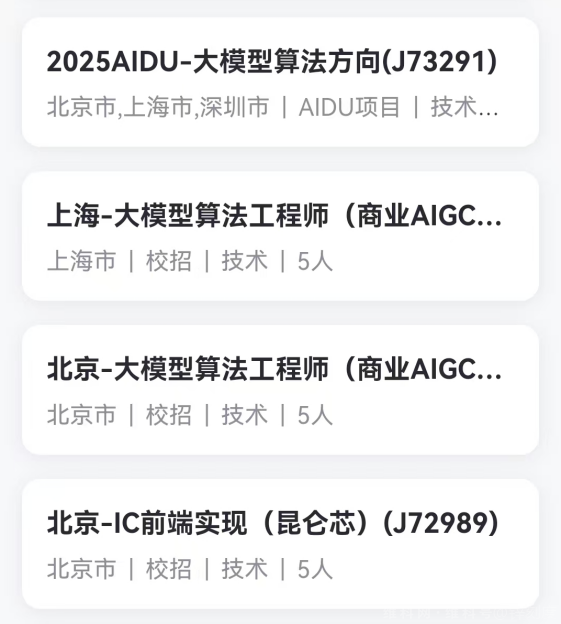
Image source: Baidu Campus Recruitment
Another example is ByteDance's 2025 campus recruitment, which offered over 4,000 positions across eight categories, including research and development, operations, and products. The demand for research and development positions increased by 60% compared to last year, with algorithm-related positions being particularly popular.
It is not difficult to see that algorithms are at the forefront.
According to the "2023 Pan-Internet Industry Talent Mobility Report," algorithm researchers topped the list of talent shortages with a talent supply-demand ratio of 0.47, with an average of two companies competing for one talent.
According to Zhaopin.com data, in the second quarter of 2024, the average monthly salary for job offers in 38 cities was 10,313 yuan, with the AI industry topping the list at an average monthly salary of 13,594 yuan, representing a year-on-year increase of 5%.
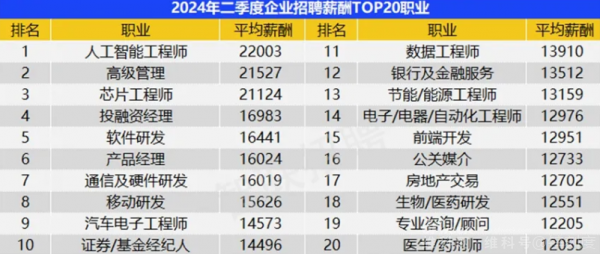
Image source: Zhaopin Research Institute
In this context, Li Zhongyan did not get what he wanted.
"I applied for almost a hundred positions, but basically got rejected from all of them," said Li Zhongyan, who ultimately secured an offer from a technology company in Xi'an focused on hardware research and development. "I've landed a job, but not quite."",The quant industry doesn't have a "996" culture
Unlike Li Zhongyan, Meng Yijun is more confident.
Majoring in computer science and having accumulated internship experience at major internet companies during his undergraduate studies, Meng Yijun feels confident about securing an offer as an AI heterogeneous computing engineer or deep learning high-performance computing research and development engineer.
The problem is that Meng Yijun wants to work in the quant industry.
Quantification involves digitizing signals in financial investment behavior, analyzing them through one or more sets of algorithms, and making judgments and decisions, rather than relying solely on human intuition or feelings.
In a nutshell, AI is the foundation of quantification.
Since the strength of AI capabilities is closely related to quantitative performance, leading quant funds are willing to offer high salaries to attract talents, even for fresh graduates, in order to maintain their leading position and technological advantage.
For example, Jiukun Investment launched the "Wutong Plan" in 2022, globally recruiting outstanding undergraduate, master's, and doctoral fresh graduates to select "quantitative stars" who can work independently.
"Don't go where there are a lot of people; you might end up doing menial tasks like data cleaning," said Meng Yijun, who believes that quantitative research is more challenging. "Quantification doesn't have a 996 culture; it allows for a work-life balance."",Despite this, Meng Yijun is still undecided.
On the one hand, the requirements of quant funds are no less demanding than those of internet companies, and in some ways, even higher, requiring visible contributions to excess returns.
Zhang Chenying, the investment director of Bailu Asset Management, said in an interview with "Waves" that "In today's Chinese quantitative private equity industry, having a large number of winners of international Olympiads such as IMO (Mathematics Olympiad), IPHO (Physics Olympiad), ICHO (Chemistry Olympiad), and IOI (Informatics Olympiad) has long been an industry standard."",On the other hand, the essence of quantification is a zero-sum game, which has caused dissatisfaction in the market and led to restrictions. Coupled with signs that the A-share market is transitioning from a bear market to a bull market, the strategies of quant funds have faced severe challenges.
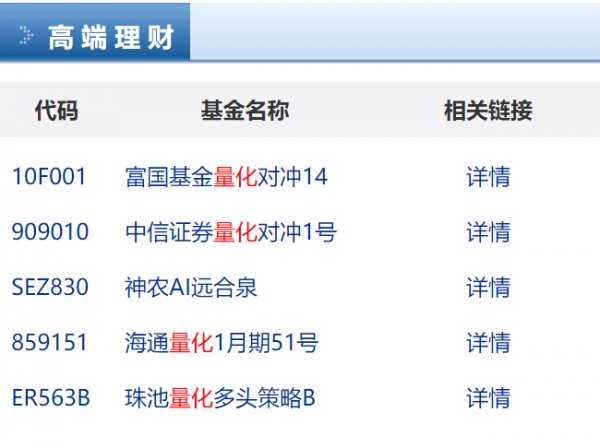
Image source: Tiantian Fund Network
On October 18, 2024, Huangfang Quantification announced to investors: "Due to changes in the market environment, it is difficult for hedging products to achieve both returns and reduce risk exposure at the same time, resulting in a significant decline in the potential return-to-risk ratio. Future returns will be significantly lower than investors' expectations. Considering the risk profile of hedging products, the company will gradually reduce the investment positions of all hedging products to zero."",Meng Yijun further told Zinke that new energy vehicles are another popular direction for AI employment.
According to the "Intelligent and Connected Vehicle Industry Talent Demand Forecast Report," the total demand for intelligent and connected vehicle talents in China is expected to reach 116,000 by 2025, with a net talent gap of up to 37,000.
This can be seen from the campus recruitment of auto companies.
Taking Lixiang Auto as an example, it launched the "Lixiang+" campus recruitment plan, which targets global recruitment of outstanding AI technology talents, covering areas such as algorithm deployment, algorithm performance optimization, inference acceleration, large language models, visual large models, multimodal perception, AIGC, intelligent driving large models, and AI chip research and development.
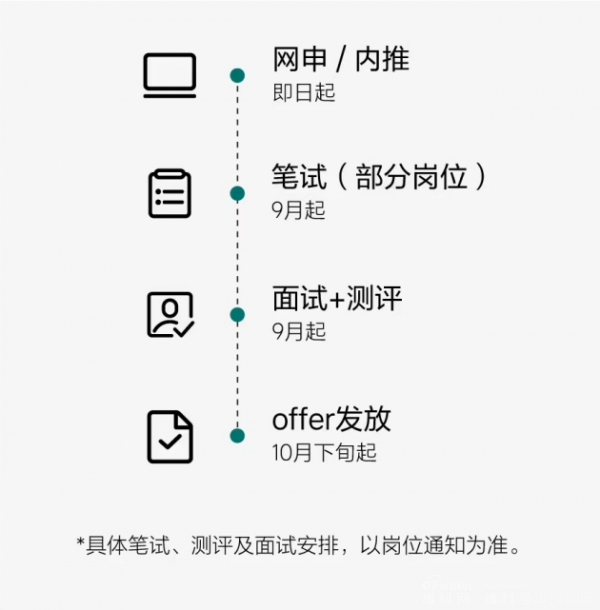
Lixiang Auto's 2025 campus recruitment process for algorithm research and development positions
Li Xiang, CEO of Lixiang Auto, said at the 2024 Spring Press Conference: "We are willing to pay higher salaries to ensure that every employee at Lixiang Auto has growth, achievement, and reward."",In fact, AI talents have become the focus and highlight of auto company recruitments.
In this regard, Elon Musk stated in April 2024 that Tesla was increasing salaries for its AI team, saying, "The AI talent war is the craziest talent war I've ever seen!"",Those who use AI wisely will win
Apart from campus recruitment, how to cultivate AI talents has become another focus.
"The AI large model is the best tool. Parents should expose their children to AI from a young age. Children who don't use AI will lose out to those who do," said Zhou Hongyi. If someone hired by 360 cannot proficiently use AI, they will surely be eliminated, he added. "Whether students can use AI and their ability to do so will determine their future development potential and growth ceiling."",As a result, establishing AI majors has become a consensus among universities.
Public data shows that in 2018, 35 universities in China offered AI majors, and by 2024, the number had exceeded 500, ranging from prestigious universities to junior colleges.
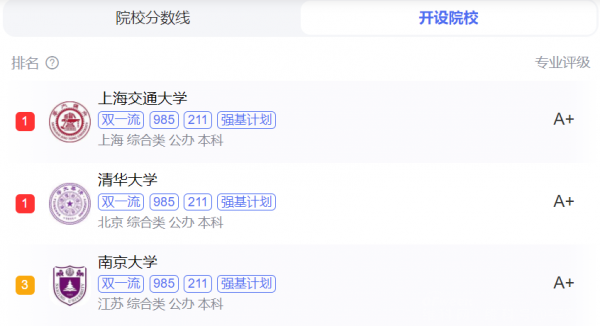
Image source: Zhangshang Gaokao
Zhang Yu, a teacher at a university, told Zinke, "Our school has strengthened the construction of AI-related majors and disciplines, added AI-related courses, and established an AI laboratory to promote the transformation and application of scientific research results."",Teacher Zhang Yu further stated that AI requires highly interdisciplinary and composite talents with a strong foundation of knowledge, technical skills, and experience accumulation. Simply adjusting parameters and calling models is not sufficient for high-paying positions. "In practical work, stacking model parameters and adjusting them are two completely different things," he explained.
In other words, it's easy to open an AI major, but not easy to cultivate AI talents.
According to China News Weekly, an investigation into the training programs of several second- and third-tier universities revealed that their newly established AI majors were extremely similar to their existing computer science, electronic information, and data science majors, with only one or two courses differing.",In fact, Teacher Zhang Xuefeng previously believed that students studying AI should aim to become T-shaped talents with a broad base of knowledge (represented by the horizontal bar of the "T") and deep expertise in a specific area (represented by the vertical bar of the "T").
As a result, there is a gap between universities and enterprises in terms of talent transfer.
Qi Yuan, Dean of the Institute of Artificial Intelligence Innovation and Industry at Fudan University, said in an interview with the 21st Century Business Herald, "In the context of rapid technological development, education is also facing a certain degree of transformation. There are two main issues here: first, how to deepen students' foundational theoretical knowledge, and second, how to strengthen their practical and analytical skills while aligning them with the needs of enterprises."",From this perspective, universities need to cultivate AI talents more precisely and improve the quality of their training to enable fresh graduates to pursue brighter futures.
Undoubtedly, AI will become a keyword in future campus recruitments.
(At the request of the interviewees, the names Li Zhongyan, Meng Yijun, and Zhang Yu used in this article are pseudonyms.)





